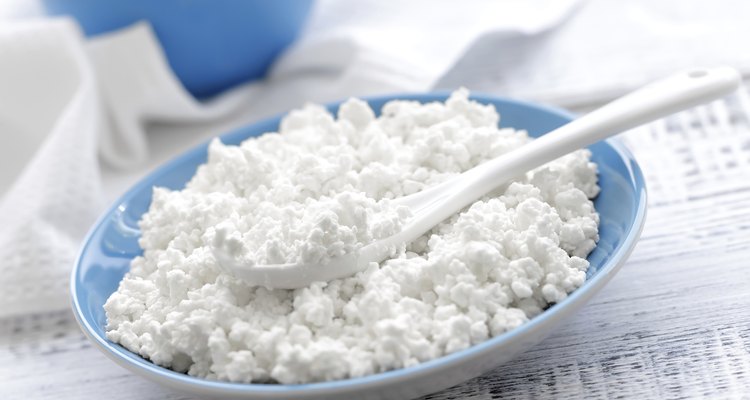
YelenaYemchuk/iStock/Getty Images
If you think of cottage cheese as a bland and boring diet food, you might want to give it another chance because not only is it good for you, but it also really works well in flavorful and nutritious meals. Each cup of low-fat cottage cheese contains 163 calories to fuel your active lifestyle and also adds nutritional value to your diet. Incorporate cottage cheese into your meals to reap the many health benefits of its nutrient content.
Complete Protein
Cottage cheese is packed with protein. Each cup provides you with 28 grams of protein, or approximately 47 percent of the daily-recommended protein intake for the average 150-pound individual, according protein intake guidelines published by the Iowa State University Extension. Like other animal-based proteins, cottage cheese provides all the amino acids you need, making it a source of complete protein. Your body breaks this protein down into its individual amino acids, and then re-assembles those amino acids into new proteins needed to maintain healthy tissue.
Calcium and Phosphorus
Cottage cheese benefits the health of your bones by increasing your phosphorus and calcium intake. Both of these minerals make up hydroxyapatite -- the mineral responsible for bone density. Calcium also plays a role in heart and muscle function, while phosphorus helps make up the structure of your DNA. A cup of cottage cheese contains 303 milligrams of phosphorus and 138 milligrams of calcium. This makes up 43 percent of your recommended daily phosphorus intake, and 14 percent of the calcium you need daily, according to the Institute of Medicine.
Riboflavin and Vitamin B-12
Cottage cheese also offers health benefits as a result of its vitamin content, and serves as an especially rich source of riboflavin -- also called vitamin B2 -- and vitamin B-12. Riboflavin activates enzymes in your cells; this enzyme activation allows you to convert food into useable energy. Vitamin B-12 supports brain function and aids in the production of red blood cells. Each 1-cup serving of cottage cheese contains 0.4 milligram of riboflavin -- 36 percent of the recommended daily intake for women and 31 percent for men -- as well as 1.4 micrograms of vitamin B-12, or 58 percent of your daily recommended intake.
Considerations and Serving Tips
Use cottage cheese as a healthful alternative to sour cream on your baked potatoes and sweet potatoes -- simply add it to your potato and microwave until warm so that the cheese begins to melt. Add a spoonful of cottage cheese to whole-wheat pasta and tomato sauce to add creaminess and nutritional value, or use cottage cheese in place of mayo in your egg or tuna sandwiches.
Whenever possible, opt for low-sodium cottage cheese. The full-sodium version contains 918 milligrams of sodium per cup -- just shy of two-thirds of the 1500- milligram maximum daily sodium intake that the American Heart Association recommends. Choosing reduced-sodium varieties can help you stay within this limit.
Related Articles
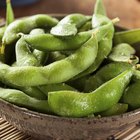
The Nutritional Value of Edamame Beans

How to use Nutritional Yeast for Soups

The Nutritional Value of Norwegian ...

Asiago Cheese Nutrition
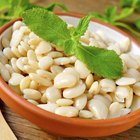
Calories per Cup of Cooked Navy Beans

How to Make the most Effective Homemade ...

Nutrition Facts for Ham, Cheese & Egg ...

What Are the Health Benefits of White ...

Nutrition Information on Blueberries

How to Make Really Good Lemonade
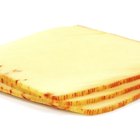
Muenster Cheese Health Benefits

Avocado Serving Size & Nutrition

Vitamins for Mental Alertness

Ham & Turkey Sandwich Calories

The Nutrition of Stone Ground Corn

How Many Calories are in Cheese Lasagna?

How to Make Glycerin Lotion
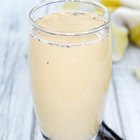
Nutrition Information For a 16-Ounce ...

Swiss vs. Cheddar Cheese Nutrition ...
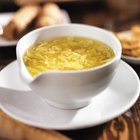
Calories in a Pint of Egg Drop Soup
References
- Linus Pauling Institute: Sodium (Chloride)
- USDA National Nutrient Database: Cheese, Cottage, Lowfat, 1% Milkfat
- Iowa State University Extension: Protein
- Linus Pauling Institute: Calcium
- Linus Pauling Institute: Phosphorus
- Linus Pauling Institute: Riboflavin
- Linus Pauling Institute: Vitamin B12
- American Heart Association: Shaking the Salt Habit
Writer Bio
Sylvie Tremblay holds a Master of Science in molecular and cellular biology and has years of experience as a cancer researcher and neuroscientist.
Photo Credits
YelenaYemchuk/iStock/Getty Images